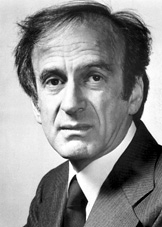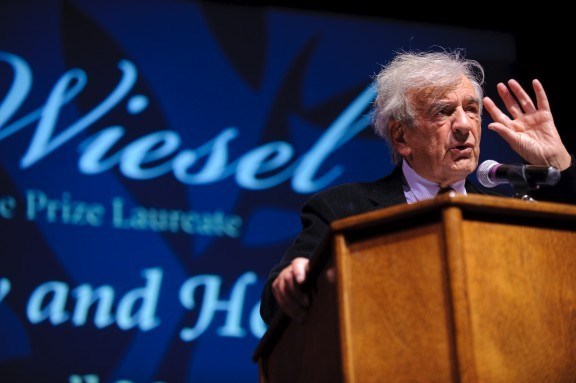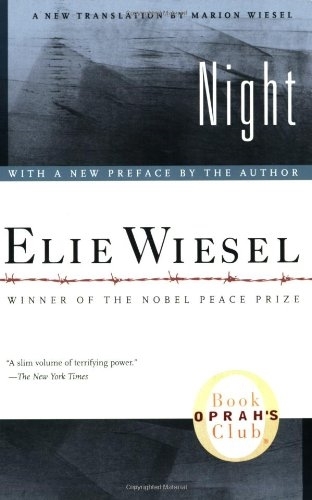 |
| (http://www.nobelprize.org/nobel_prizes/peace/laure ()) |
"I swore never to be silent whenever and wherever human beings endure suffering and humiliation. We must always take sides. Neutrality helps the oppressor, never the victim. Silence encourages the tormentor, never the tormented." ( Elie Wiesel.) Silence is for people without a voice, without power, being normal helps the enemy, never yourself. Silence encourages the enemy and shows everyone else you are weak, be different and not tormented. My hero is Elie Wiesel, a journalist, born in September 30, 1928, in Sighet, Hungary, Romania. At 15 years old, he and his family was sent to a death camp called Auschwitz. Elie doesn't know how because the rest of his family had died at the camp, nevertheless he was one of the few survivors from the Holocaust. His family are of course the important people in his life, with their unconditional love, but also anyone else listening to what he has to say are the most important ones. His stories, his lectures, and his book, those people are his followers. Whom he had inspired by his experience and what he has done for us, to never forget what had happened and what had scarred the world in the beginning, of 1944. Elie Wiesel was mostly known for surviving the death trap, Auschwitz, but he also took place in the events after his survival when he dedicated his life to preserving the memory of the Holocaust for future generations and has been a strong advocate for human rights around the world. Right after he aforesaid this famous quote, "The only role I sought was that of witness. I believed that having survived by chance, I was duty-bound to give meaning to my survival, to justify each moment of my life." ("Elie Wiesel." Contemporary) After this his story spread all across the world when he wrote the famous book of his experience, Night. In 1986 he later won the Nobel Peace Prize. Shortly afterwards he established the Elie Wiesel Foundation for Humanity. He was a driving force in the creation of the U.S. Holocaust Memorial Museum in Washington, D.C., and was rewarded with the Congressional Gold Medal and the Presidential Medal of Freedom for his work. Elie Wiesel is more than just a survivor of one of the most crucial events in history, he is a journalist that wrote about his experience and his message that he would like to portray. Additionally, he is a Nobel Peace Prize winner because he portrayed courageousness, selflessness, and integrity. Not only in the holocaust, but when he told everyone in the whole world his message.
Elie Wiesel shows selflessness throughout his life while encountering some life or death decisions for standing up for his dad and his people. Willing to to get hurt for them and always was a team player. Elie also shows his selflessness when he talks out to others not for the fame or money, but to give a message. After he had survived the holocaust he didn't talk for a while until he decided it was time for the world to know what had happened. So the whole world wouldn't allow this to happen again. Additionally, Elie Wiesel is selfless because, all he thought and worried about is his father and his people willful enough to be generous to them like in this example, "We were given soup... I gave him what was left of my soup" (pg. 107) Elie shows his selflessness throughout this story when he offers his food to another because it is more important to the others than to him. In other words they will need it, Elie would rather them be robust and knew it was the right thing to do. Furthermore, he stands up for his people and their beliefs after surviving the holocaust. He conjointly makes sure everyone single person in the world hears about and know the names of the innocent people who had died in such a tragic experience. He lastly makes sure no one will forget the horrific event in history called the holocaust, so this can never happen again. Because of people like him, hopefully history won't repeat itself as long as history is told. Elie isn't a man of himself, he thinks of others, his friends, his foes, and especially the future for the world to make a better place for example, "Wiesel always writes as a Jew, but he does not speak only of Jews. He raises his voice on behalf of all who are in pain, all who are in need of refuge." ("Elie Wiesel."Encyclopedia.) He doesn't write for the fame and sympathy, he writes for the people in pain and or the people who have faith in him, further known as his inspirers. In addition, to his beliefs and what he has been trying to portray he writes to inform others, to never forget the time he and his people were under attack because of a lie told about his race. He also wants to tell his story of what happened so more people can believe and hear what he had to say, which is when he started to writing books. Elie started out as a scared, selfless kid when he was taken into the holocaust, but as he got closer to the end he chose the path of the good, selfless hero. Determining his fate of being a survivor and to tell this monstrous nightmare for the future to prevent the engraved scar of history.
 |
| (http://blogs.chapman.edu/wilkinson/2014/04/01/a-we ()) |
Elie was courageous throughout his story told throughout history. His courage throughout the holocaust kept him alive and the hero, he is today. He is not someone who just is scarred for life for what happened to him, he is also a survivor who described his courage word for word, putting an image in your head to make sure you never forget the true story that shocked the world. Elie Wiesel proves himself worthy enough to be more equal as and even stronger than his enemies when he does the following, "He proved and showed courage through his heroic actions to help his father and himself to keep alive. Also being able to defy the societal rules by standing up to power." (Mach.) Elie shows courage throughout this horrific time when he does anything he can possibly do to make sure that he and his dad will survive. By stepping up as a leader, trying to set his and his father's faith to become survivors. Taking the responsibility for their lives and their future. Elie was courageous throughout his stories because he had the motivation to make a stand against his enemies and never giving up. Doing anything he can to survive, taking many life or death risks. Elie Wiesel furiously got tired of his people being treated like trash and was prepared to make a stand to defend his people, showing his true courage when he did the following; "Even if that means being in risk of getting killed because of helping his father and himself get extra amount of food. Even if that means of wanting to hurt the people who hurt his father." (Mach). He was standing up against the power of his enemies and withstand his beliefs, risking his life for his courageous decisions. Eventually, making him want to protect his dad because of what these people have been doing to his friends, family, and race was inhuman. At this point Elie started to get irritable of what these people were doing to him and his people, and made the decision that he will live to tell the story. These conditions gave him confidence, and courage to live. Doing anything possible to survive, pushing him to his limits, becoming a leader for his dad. Because if Elie weren't to do anything and give up, so will his dad, but if he takes responsibility of a leader showing his courage others will follow.
Elie Wiesel's most important characteristics of being a hero is his integrity, Elie follows his beliefs which helped him become one of the few holocaust survivors. After everything that had happened to him throughout the holocaust, his beliefs remained the same. Because of his integrity, he helped set his fate on the road of the future making him not just a survivor. Elie shows his integrity by not letting anything change his beliefs, but himself, showing it by, "He stands up to religious discrimination by still believing there's a God even though he went through all the hardship from the concentration camps."(Mach) Meaning whatever had happened to him throughout this time he still remained the same man of his beliefs. Leading him to his own success because nothing changed in what he believed in after his experience. Elie was the one who made himself famous by following and representing his beliefs, in addition to telling his side of the story. Elie was a man of his word after everything that he has been through, he still stuck with his beliefs and didn't let any obstacle change it. For example, "Wiesel is perhaps the only Jewish leader who speaks without the power of office or vast wealth to command the attention and respect of his audience. Seemingly aloof from politics, he stands above the controversies that consume most others within the American Jewish leadership." ("Elie Wiesel." Encyclopedia.) He goes with state of mind, his beliefs and tells people to remember the past to make a better future. He does this, not for fame nor money, but earned it by following his own motivation and beliefs. Even when he was offered money he doesn't believe he intentionally needs it and uses it to build foundation, followed by a museum. Because that's what he believes is right and still follows his religious beliefs after everything that happened to him. Integrity is one of the key characteristics in Elie Wiesel. Everyone lies because they are afraid of the truth and make bad decisions because they afraid of reality, but not Elie. He couldn't lie about his family dying and his race almost becoming extinct. Furthermore, he tells the truth for us, it's his belief to make our society, our future better. He continued his belief after all of the pain and agony that he went through, but still has the same belief he had before the holocaust. Making him a better man he was before, stronger and wise.
 |
| (http://www.amazon.com/Night-Elie-Wiesel/dp/0374500 ()) |
Elie Wiesel, is more than just a survivor, but a journalist, and Nobel peace prize winner. A hero, who showed selflessness, courageousness, and integrity throughout his whole life. Elie Wiesel is a hero whose story spreads, touching everyone who gave him the time and would listen to his life changing story. He isn't just a hero for one thing either, he's a hero because of six things. Such as, surviving the holocaust, writing his stories and messages into books, becoming a journalist, winning the Nobel peace prize, and donating the money he earned into a foundation and museum. Elie Wiesel not only inspired me by his survival and Nobel peace prize, but mainly by his messages and life lessons he has taught us, "No human race is superior; no religious faith is inferior. All collective judgments are wrong. Only racists make them" (pg.8) No one and no race is better than someone else. We all have the same material to become just as good as someone else. It's our decision to decide what we pick. Beliefs are your goals, someone elses beliefs can't be better than one other especially when one is intended for the each and every own individual. We are all created equally, but we also have our differences, being unique, having different ideas, different beliefs, but in the end we all come together. Leading us to say, We are all created equal, treat one another as you would like to be treated. It's not our job to judge, it's our job to work with what we are given and come together to become united as one. As Wiesel has stated in the beganing, "Don't be the quiet or the weak one in your deepest times, be the different one, the leader, a hero." Prove your haters wrong, and be a hero. No one has control over our faith, but us. Your race is nothing big or small, we are all different for a reason, but were all the same on the inside. Your religion are your beliefs don't let anyone take that away from you, for it's our own destiny, not theirs. Our job is to get through our obstacles that are thrown in front of us to find success, to release our own inner hero that we all can be. When there is an opportunity to be greatness we seize it. We are humans, we make mistakes and encounter them, and when we're in our deepest point of failure from someone's mistakes, we see an opening. A light to success, a new light to seize, using that failure to soon become great. That's the beauty of heroes, they too were in dark times, had flaws, and had no faith. That feeling will eventually subside and we can use that negative power, into a positive power to become determined. To prove that there is hope, and inspiration to do great. Don't let anyone change who you are, because you are your own hero who always admires other to become marvelous and no one has control over that than oneself. Know that our deepest times are our greatest motivation to be inspired, to be great, to be determined, to have hope, and to be our own hero. Works Cited Mach, Shirley. "Elie Wiesel: A Hidden Unsung Hero." Unsung Hero of 2012. N.p., 05 Dec. 2012. Web. 09 Feb. 2015. "Elie Wiesel." Contemporary Heroes and Heroines. Vol. 1. Detroit: Gale, 1990. Biography in Context. Web. 22 Jan. 2015. "Elie Wiesel." Encyclopedia of World Biography. Detroit: Gale, 1998. Biography in Context. Web. 22 Jan. 2015 Wiesel, Elie, and Marion Wiesel. Night. New York, NY: Hill and Wang, a Division of Farrar, Straus and Giroux, 2006. Print.
Page created on 2/15/2015 12:00:00 AM
Last edited 2/15/2015 12:00:00 AM
